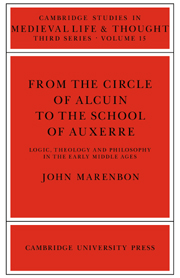 From the Circle of Alcuin to the School of Auxerre
From the Circle of Alcuin to the School of Auxerre Book contents
- Frontmatter
- Contents
- Acknowledgements
- Introduction
- 1 Aristotle's Categories and the problems of essence and the Universals: sources for early medieval philosophy
- 2 Logic and theology at the court of Charlemagne
- 3 Problems of the Categories, essence and the Universals in the work of John Scottus and Ratramnus of Corbie
- 4 The circle of John Scottus Eriugena
- 5 Early medieval glosses on the problems of the Categories
- Conclusion
- APPENDIX 1 Texts from the circle of Alcuin
- APPENDIX 2 A Periphyseon florilegium
- APPENDIX 3 Glosses to the Categoriae Decem
- Bibliography (including index of manuscripts and list of abbreviations)
- Index
Introduction
Published online by Cambridge University Press: 24 October 2009
- Frontmatter
- Contents
- Acknowledgements
- Introduction
- 1 Aristotle's Categories and the problems of essence and the Universals: sources for early medieval philosophy
- 2 Logic and theology at the court of Charlemagne
- 3 Problems of the Categories, essence and the Universals in the work of John Scottus and Ratramnus of Corbie
- 4 The circle of John Scottus Eriugena
- 5 Early medieval glosses on the problems of the Categories
- Conclusion
- APPENDIX 1 Texts from the circle of Alcuin
- APPENDIX 2 A Periphyseon florilegium
- APPENDIX 3 Glosses to the Categoriae Decem
- Bibliography (including index of manuscripts and list of abbreviations)
- Index
Summary
To most educated laymen, the term ‘medieval philosophy’ conjures up the names of the great scholastics of the thirteenth and fourteenth centuries: Aquinas, Duns Scotus and William of Ockham. Occasionally, this mental picture will be extended backwards in time to include the ‘Platonism of the School of Chartres’ and Anselm; but, almost invariably, the period before the eleventh century will be omitted. This book is a contribution to the study of that neglected age of philosophy. It is not a comprehensive history of early medieval thought, but an attempt to illustrate the character and continuity of the first main period of medieval philosophy, which stretched from the Circle of Alcuin in the late eighth century, to the School of Auxerre in the early tenth.
Such an enterprise raises two immediate questions. Why pick Alcuin as a starting-point and not, say, Cassiodore, Isidore or Bede? And what aspect of the thought of the early Middle Ages can sensibly be called ‘philosophy’, as opposed to ‘logic’ or ‘theology’? My answers to these questions, which cannot be given entirely separately one from the other, have determined much in what I have chosen to discuss, and what pass by in silence, in the pages which follow.
Whatever doubts there may be about the originality of much of Boethius's work, it is beyond question that his writings contain substantial discussion, at first or second hand, of philosophical issues: the problem of Universals, free-will and determinism, and the nature of time are just a few examples.
- Type
- Chapter
- Information
- From the Circle of Alcuin to the School of AuxerreLogic, Theology and Philosophy in the Early Middle Ages, pp. 1 - 11Publisher: Cambridge University PressPrint publication year: 1981
